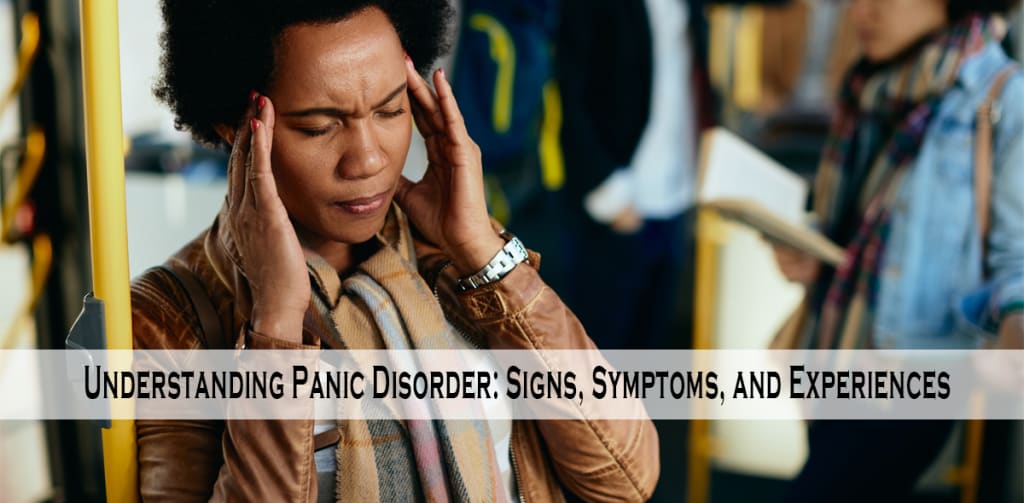Understanding Panic Disorder: Signs, Symptoms, and Experiences
Panic Disorder: Signs and Symptoms

Panic disorder is a type of anxiety disorder characterized by recurrent, unexpected panic attacks. These intense periods of fear are accompanied by physical, emotional, and mental symptoms that can be so severe that people often believe they are having a heart attack. Recognizing the signs and understanding the experiences of those with the disorder can provide insight for both sufferers and their loved ones.
What is Panic Disorder?
At the core of panic disorder are panic attacks. Many people experience a panic attack at some point in their lives due to specific triggers or stressful situations. However, those with panic disorder have frequent and sudden attacks without a clear cause. Due to the unpredictability that often characterizes a panic attack, you may be anxious about when the next one will happen. You may also avoid places or situations where previous attacks have occurred.
Panic disorder affects approximately 2-3% of the U.S. population in any given year and can begin in late adolescence or early adulthood. Though its causes are not fully understood, it is thought that traumatic life experience, genetics, stress, changes in brain functionality, or a combination of these might play roles in its development.
Signs and Symptoms
Panic attacks can arise suddenly and peak within minutes. Below are some common symptoms.
Physical symptoms:
- Heart palpitations or accelerated heart rate.
- Trembling or shaking.
- Shortness of breath or feeling smothered.
- Feeling like you are choking.
- Chest pain or discomfort.
- Nausea or abdominal distress.
- Feeling dizzy, unsteady, lightheaded, or faint.
- Chills or heat sensations.
- Numbness or tingling.
2. Cognitive symptoms:
- Fear of losing control or going crazy.
- Feeling disoriented or confused.
- Fear of dying.
- Feeling detached from oneself and reality.
Individuals with panic disorder often become hyper-aware of physical sensations. They then interpret these sensations as signs of an impending panic attack. This can lead to increased anxiety and potentially another attack.
Living with Panic Disorder
Life with panic disorder can be challenging. The unpredictability of attacks creates a constant state of fear or anxiety. This impacts your daily activities, relationships, school, and work. Many sufferers become hyper-vigilant about their health and frequently seek medical reassurance.
The constant worry about another attack can lead to behaviors known as agoraphobia. This is an intense fear and avoidance of situations where escape might be difficult, or where help would not be available if a panic attack occurs. This might include avoiding crowds, driving, or even leaving the house.
Additionally, people with panic disorder might withdraw from social situations. This stems from being afraid that you will have a panic attack in public. The constant strain can lead to other mental health issues such as depression or other anxiety disorders. You may have difficulty performing at work or school. It is hard to concentrate when you are constantly on edge or fearful. If you have had a panic attack in a specific place, you may avoid that place in the future or begin to fear going there.
Real-Life Experiences
Sarah, a teacher, experienced her first panic attack during a staff meeting. Without warning, her heart starting racing, she felt like she could not breathe, and she thought she was having a heart attack. Though a trip to the emergency room confirmed her health was fine, the fear of another episode meant she started avoiding staff meetings. Soon, this extended to any large gathering, as the thought of attending made her fearful and anxious.
After having panic attacks at a mall, a friendly football game, and a dinner party, Sal started avoiding crowded places, fearful of another episode. This phobia extended to a point where even the thought of going to a supermarket or taking public transport was petrifying.
Therapy can Help

Though panic disorder can be a challenging condition, you can improve your quality of life with professional help, self-care, and a support system. Anxiety therapy, trauma therapy, or individual therapy can help with reducing the symptoms of panic disorder and its affect on your life. Early intervention can reduce the severity of the disorder and improve the quality of life. Sharing your experience with those close to you can provide you with the support and empathy you need.
Trust Mental Health offers therapy in California. Our team of BIPOC therapists is experienced in various therapeutic services and accepts new clients with 48 hours. Contact us today for a free 15 minute consultation.
FAQs
What is a panic disorder?
Panic disorder is an anxiety disorder characterized by recurrent, unexpected panic attacks. These are sudden bouts of intense fear that have severe physical and emotional reactions even when there is no real danger or apparent cause.
How is a panic disorder different from a panic attack?
A panic attack is a sudden episode of intense fear and anxiety, while panic disorder is a condition where an individual experiences recurrent panic attacks and lives in fear of them happening again. Not everyone who experiences a panic attack will develop panic disorder.
Are the symptoms of a heart attack and panic attack similar?
They can be similar, which sometimes makes people think they are having a heart attack during a panic episode. Both can involve chest pain, increased heart rate, and shortness of breath. However, panic attacks usually subside in a few minutes, while heart attack symptoms persist and can be accompanied by pain radiating to the arm or jaw and cold sweat. Seek medical help immediately if you feel you are having symptoms of a heart attack.
About the Creator
Trust Mental Health
Trust Mental Health offers both online and in-person therapy. Our therapists come from diverse backgrounds and speak multiple languages. Visit our website to learn more #TrustmentalHealth






Comments (1)
Nice Article ❤️📝✌️💯